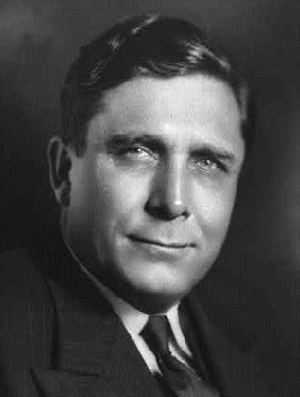 SKC Films Library SKC Films Library |
| |
| SKC Films Library
>> American History
>> United
States: General History and Description >> Early 20th Century, 1901-1960 >> Individual Biography, A-Z |
 Wendell Lewis
Willkie Wendell Lewis
Willkiepresidential candidate Lewis Wendell Willkie was born in Elwood, Indiana, on February 18, 1892. He attended the local public schools, received his BA from Indiana University in 1913, and then taught high school history for one year in Coffeyville, Kansas, for a year; he then returned to Indiana University, from which he received his law degree in 1916. When World War I broke out, Willkie enlisted in the Army and trained as an artillery officer; his first and middle names were accidentally reversed in his enlistment papers, but Willkie liked the change and never corrected the mistake. After training he was sent to France, but arrived just as fighting came to an end there. He was subsequently sent to the American headquarters in Paris to assist in court-martial cases. After the war, Willkie joined a private law firm in Akron, Ohio, that represented the Firestone Tire and Rubber Company. He married Edith Wilk in 1919; the couple eventually had one son, Philip. Willkie first entered politics in 1924, when he served as a delegate to the Democratic National Convention, where he lobbied in favor of the League of Nations and against the Ku Klux Klan. In 1929, he became legal adviser to the Commonwealth and Southern Electric Utilities Company; he became the company's president in 1933. As a delegate to the 1932 Democratic National Convention, Willkie supported Newton D. Baker, former Mayor of Cleveland and Secretary of War, for the presidential nomination. The convention nominated Franklin Delano Roosevelt instead, but Willkie stayed loyal to the party and campaigned on behalf of Roosevelt. He subsequently supported many of Roosevelt's New Deal programs, as well as Roosevelt's call for American support of its European allies against Germany. Willkie's support for Roosevelt ended when Congress authorized the establishment of the Tennessee Valley Authority (TVA). According to Willkie, since the TVA was operated by the federal government it did not have to make a profit and could, therefore, charge much lower rates for electricity that any privately-owned utility, and that amounted to unfair competition. As president of the TVA's principal privately-owned competition in Tennessee, Willkie fought several court battles with the TVA, but was eventually forced to sell Commonwealth's Tennessee Electric Power Company to the TVA for $78 million. In 1940, Willkie switched parties and became a contender for the Republican presidential nomination, which he eventually secured; his running mate was Senator Charles L. McNary. His campaign against those New Deal programs that competed with private enterprises earned him a lot of popular support, but his support of increased aid to Allied forces in Europe angered isolationist Republicans. He ultimately lost the general election to FDR by an electoral vote of 449 to 82. After the United States entered World War II, Willkie rallied his supporters in a program on national unity. In 1942, he toured Britain, the Middle East, the Soviet Union and China on behalf of Roosevelt. In 1943, he published One World, in which he outlined his ideas for international cooperation. That same year, he and Eleanor Roosevelt helped establish Freedom House. Willkie was again a candidate for the Republican presidential nomination in 1944, but he dropped out after losing the Wisconsin primary. Wendell Willkie died of a heart attack in New York City on October 8, 1944. SEE ALSO |
SKC Films Library >> American History >> United States: General History and Description >> Early 20th Century, 1901-1960 >> Individual Biography, A-Z This page was last updated on February 18, 2017. |